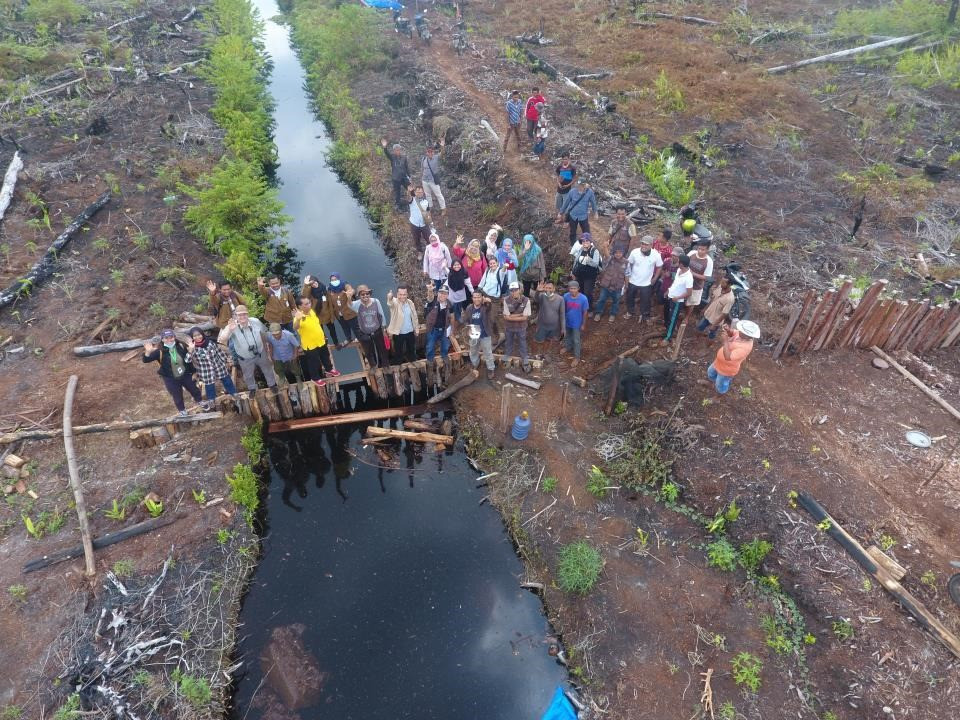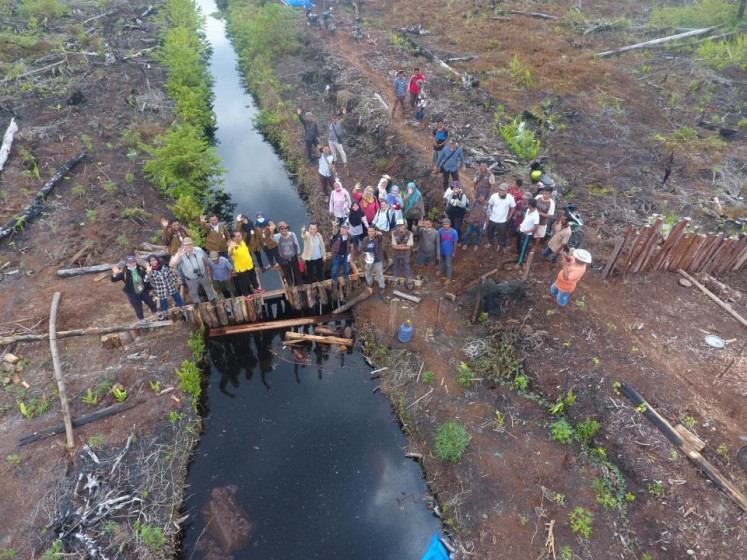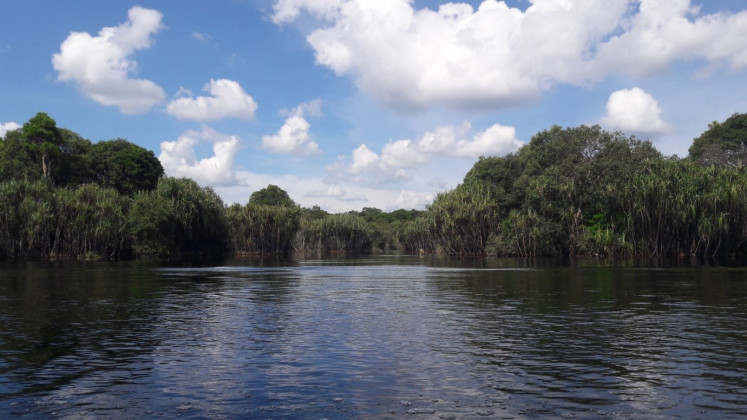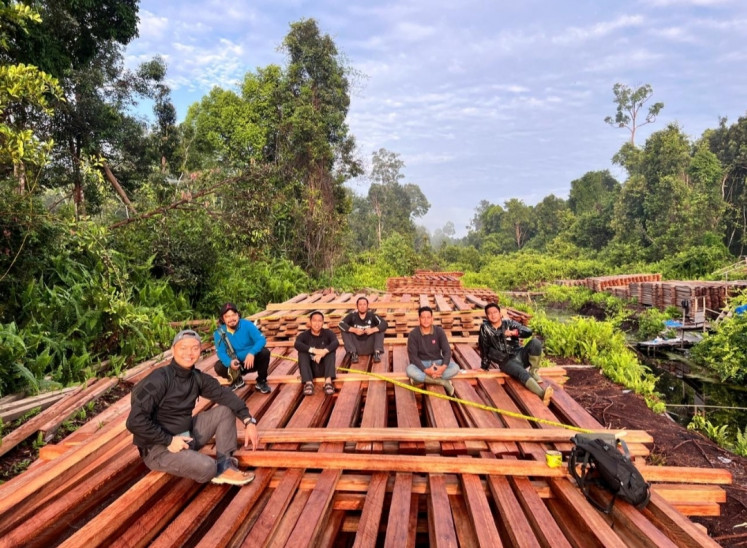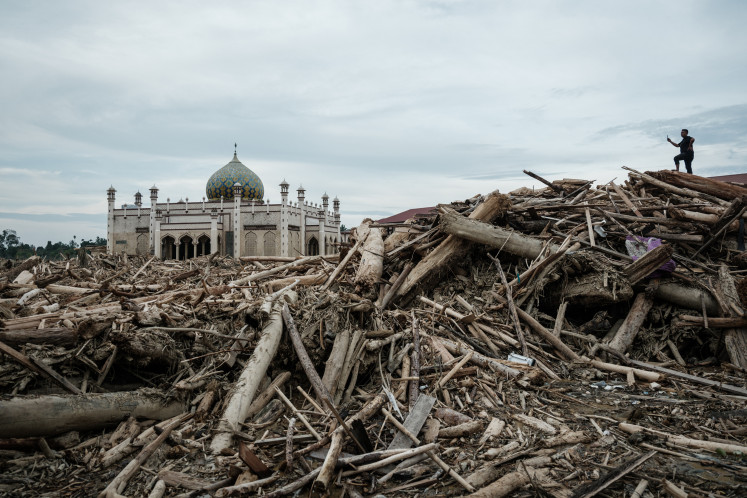Popular Reads
Top Results
Can't find what you're looking for?
View all search resultsPopular Reads
Top Results
Can't find what you're looking for?
View all search resultsIndonesia-IFAD partnership advancing peatland policy agenda for global climate mitigation
As all eyes turn to the UNFCCC 26th Conference of the Parties (COP26) in Glasgow, where the world is gathering to create a blueprint for climate action, an oft-overlooked area is getting new prominence.
Change text size
Gift Premium Articles
to Anyone
A
s all eyes turned to the UNFCCC 26th Conference of the Parties (COP26) in Glasgow, where the world is gathering to create a blueprint for climate action, an oft-overlooked area is getting new prominence. Peatlands – wetland ecosystems covered by layers of partially decayed plant material that accumulates over many decades – play a crucial role in mitigating climate change. They store twice as much carbon as all the world’s forests and host everything from orchids to orangutans. But peatlands are in peril.
Indonesia committed to reducing its greenhouse gas (GHG) emissions by 29 percent below the business-as-usual scenario by 2030 in its Nationally Determined Contributions as part of the Paris Agreement (or by 41 percent with international support). This includes a 60 percent reduction from the forest management sector, of which forest and peatland management and fires are a part, and which contributes over 60 percent of the country's GHG emissions. And in March 2018, Indonesia and the Congo basin countries signed the Brazzaville Declaration, a historical agreement that promotes better management and conservation of peatlands. This was followed by the launch of the International Tropical Peatland Center (ITPC) – a collaborative institute established jointly with the Democratic Republic of Congo, the Republic of Congo and Peru, and supported by the Center for International Forestry Research (CIFOR), the United Nations Environment Programme (UNEP) and the UN Food and Agriculture Organization (FAO). This collaborative institute was established in October 2018 and intended for researchers from around the world to exchange lessons for practical action
National preventive measures to discourage peatland degradation include incentives for agricultural stakeholders to clear land without burning, disincentives such as fines, awareness-raising programs targeting local communities, capacity building of national and local institutions and staff, and certification mechanisms through the Indonesian Sustainable Palm Oil/Roundtable on Sustainable Palm Oil standards.
The Environment and Forestry Ministry and the International Fund for Agricultural Development (IFAD) have been working together to advance the haze-free and sustainable peatland management agenda for over a decade. Starting with the ASEAN Peatland Forests Project from 2009-14, which supported the establishment of the regional ASEAN coordination platform, coupled with regional fire management and pilot community-based restoration activities in Indonesia, Malaysia, Vietnam and the Philippines. As part of the ongoing IFAD-assisted Sustainable Management of Peatland Ecosystems in Indonesia (SMPEI) initiative funded by the Global Environment Facility, the Environment and Forestry Ministry has developed and implemented sub-regulations and technical guidelines governing the sustainable use and management of peatland ecosystems as an effort to guide the implementation of the recently issued national peatland regulation (PP71/2014 -PP57/2016). These regulations include those on the national mapping exercise using Peat Hydrological Unit (PHU) level demarcation (SK129/2017), guidelines on the development of wetting infrastructure for restoring peat ecosystems i.e. canal blockings (P3/2018), guidelines for the monitoring of groundwater levels and peat subsidence on community peatlands (P3/2019) and many more. An innovative national monitoring system that combines remote sensing imagery, ground-level proofing and data collection with the mapping of all peatland areas in the country will enable the government to effectively implement these regulations.
Most importantly, SMPEI supported the development and initial implementation of the new National Peatland Ecosystem Protection and Management Plan, which was adopted in 2020 and will be in force until 2049. This marks the first time a national strategy specific to the peatlands, covering nearly three decades, has been developed. The strategy will serve as a starting point to develop province and district-level strategies, such as those that will be developed as part of SMPEI in 2021 for the Indragiri Hilir and Indragiri Hulu districts.
The National Peatland Ecosystem Protection and Management Plan is also an example to neighboring ASEAN countries and will inform the updated ASEAN Peatland Management Strategy for 2021-2030 through IFAD’s regional grant to ASEAN on peatland management, namely Measurable Action for Haze-Free Sustainable Land Management in Southeast Asia, in collaboration with the Center of International Forestry Research (CIFOR) and the Global Environment Center (GEC).
If we can sustainably manage peatlands, we can reduce emissions and revive an essential ecosystem that provides many services – for people, the planet and the climate. Keeping up the momentum generated at COP26 will be essential, and peatlands must keep our attention, locally and globally, if we are to limit global average temperature rise. Capitalizing on ongoing commitment demonstrated by the government of Indonesia, it is now an opportune time to take urgent action everywhere – and especially in the tropics – to keep the carbon locked in peatlands where it is — wet, and in the ground.

